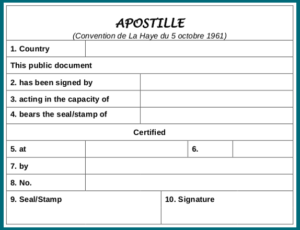
The Hague Apostille • Image: Natalie Krugiolka
If you want the use the certified translation of a document abroad, you’ll often need an apostille …
… certification. The so called Hague Apostille serves as an additional certification (authentification) which confirms, in this case, that the sworn translator is authorized to issue the certification of the translation.
Issuing authority for the apostille for certified translations
- In Berlin, you can apply for the apostille for a certified translation at the following authority:
Berlin Regional Court
Office for Legalizations and Apostilles
Address: Geschäftsstelle für Legalisationen und Apostillen
beim Landgericht Berlin – Dienststelle Littenstraße – Littenstraße 12 – 17, 10179 Berlin
- More generally, in Germany, the issuance of the apostille varies depending on the Federal State. It’s therefore advisable to inquire specifically about the authority in charge of issuing the apostille.
Which countries use the apostille?
Whether you may actually use the apostille as an additional certification for a certified translation, depends on whether the country in question has signed the Apostille Convention. Currently, the Hague Apostille Agreement No. 12 of 5 October 1961 on the use of the apostille as a simplified authentication has more than 100 member states.
You can find the list of the contracting states of the Apostille Convention at the webpage of the Hague Conference of Private International Law (HCCH).
What if the target country doesn’t accept apostilles?
In the case that your target country isn’t a member state of the Apostille Convention, you may ask for the issuance of a preliminary certification (“Vorbeglaubigung”) by a German authority (in Berlin, the Berlin Regional Court), and request subsequently the legalization of the latter through the target country’s Embassy.